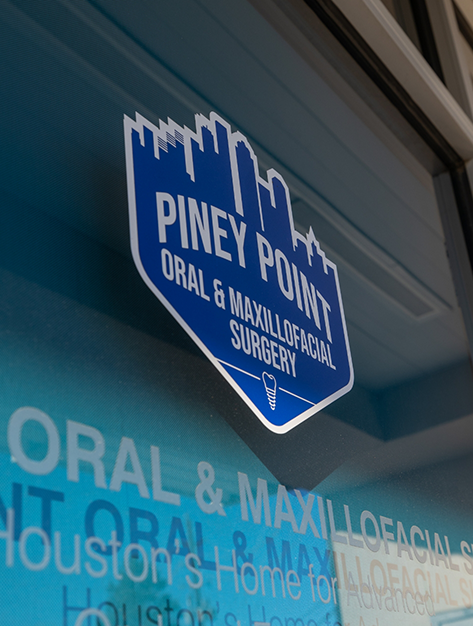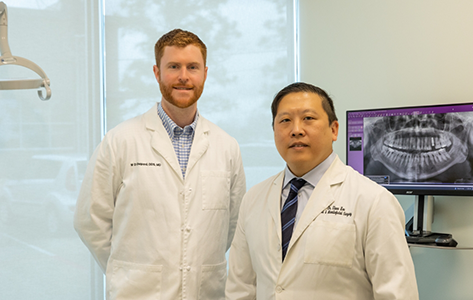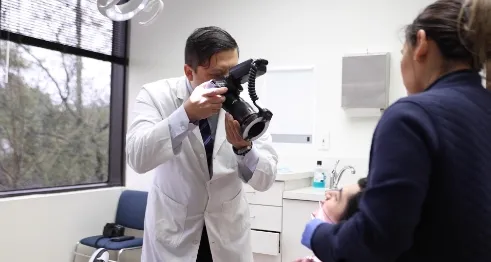WHAT IS ORAL AND MAXILLOFACIAL SURGERY? HOUSTON
Advanced Surgical Services from Trusted Specialists

Chances are, if you’re looking for an oral and maxillofacial surgeon, you’re either looking to replace missing teeth with dental implants, address developmental concerns involving the facial bones, like cleft lip and palate or TMJ disorder, or another complex issue. Experts at Piney Point Oral & Maxillofacial Surgery of Houston have years of specialized experience and training that allow them to call themselves oral and maxillofacial surgeons. Learn more about this sub-specialty of the dental and medical fields and why it’s important to choose a specialist for complex care involving the mouth, face, and jaw.
What Does Oral & Maxillofacial Surgery Mean?

Oral and maxillofacial surgery (OMS) is, in fact, a dental specialty, and one that, in many ways, bridges the gap between medicine and dentistry. Your oral surgeons in Houston are the physicians of the mouth and jaws. Their scope of practice includes the surgical and non-surgical treatment of most diseases and abnormalities of the mouth, jaws, and face. This includes everything from removal of teeth to the treatment of facial trauma and jaw reconstruction procedures.
What Training Does an Oral & Maxillofacial Surgeon Have?

Oral surgeons attend four years of dental school following their undergraduate studies. Upon completion of dental school, a hospital-based residency of at least four years is required. This includes completing rotations in medicine, general surgery, and other oral surgical specialties to put their academic knowledge into action. Because administration of general anesthesia and intravenous sedation is such an integral part of their practice, oral surgeons also train for four to six months in hospital-based general anesthesia, doing nothing but intubated general anesthesia for non-dental cases. Due to the necessity for such advanced training, some oral and maxillofacial surgeons also complete a medical degree.
Oral Surgery Services We Provide

As highly skilled oral surgeons in Houston, we provide a range of advanced services, including:
- Removal of wisdom teeth and other dentoalveolar surgery
- Orthodontic related surgery for children and adults
- Orthognathic (corrective jaw) surgery
- Dental implant placement and pre-prosthetic (denture) surgery
- Repair of soft and hard tissue facial trauma
- Diagnosis and treatment of cysts and tumors (pathology) of the mouth and jaws
- The management and treatment of TMJ (temporomandibular joint) disorders
- Endodontic microsurgery (apicoectomies)
- The treatment of serious head and neck infections
- The diagnosis and treatment of oral and maxillofacial diseases
- The diagnosis and treatment of facial pain
- General anesthesia and IV sedation
- Reconstruction following cancer surgery or trauma
- Repair of facial clefts and craniofacial defects
Understanding the Cost of Oral & Maxillofacial Surgery
The cost of oral surgery can vary greatly. It depends on several factors, such as the specific procedure a patient is undergoing, the extent of that procedure, and whether there are any complicating factors. During your consultation, we will be able to provide you with an estimate for the price of your care. We can also assist you as you explore options to manage the financial aspect of your surgery. For example, insurance or financing might make it easier for you to afford your needed procedure.
Factors That Can Affect the Cost of Oral Surgery

Some factors that can affect the cost of oral surgery include:
- The specific procedure. For example, wisdom teeth extractions can cost anywhere from a few hundred dollars to over $1,000 per tooth. Dental implant placement may cost a couple thousand dollars per implant. Facial reconstruction surgery has the potential to cost tens of thousands of dollars.
- The extent of the procedure. Logically, removing one impacted tooth costs less than removing a full set of four wisdom teeth, and placing just one or two dental implants costs less than full mouth reconstruction.
- The type of anesthesia used. Local anesthesia tends to be relatively inexpensive, whereas general anesthesia is much more costly because it requires advanced equipment, oversight from a specialist, and close patient monitoring.
Does Dental Insurance Cover Oral Surgery?

Many of the services we offer are considered to be “major services” by dental insurance companies. In most cases, this means that their price is 50% covered, up to the amount of a policy’s annual maximum. For some patients, this can reduce their out-of-pocket costs by several hundred dollars or more.
We can also help you investigate whether your medical insurance may be able to help you save more. For example, it might cover reconstruction surgery, certain types of pathology, treatment for infections of the head and neck, and other procedures that relate closely to your overall health.
Other Options for Making Oral Surgery Affordable

As your oral surgeons in Houston, we want to help you afford your care. To that end, we can accept financing through third-parties, some of which offer low-interest payment plans for medical and dental services. If you are concerned about being able to pay for your procedure, please let us know. In certain circumstances, we are able to make special arrangements.
Are you ready to learn more about the cost of oral surgery? Get in touch with the Piney Point team today.

